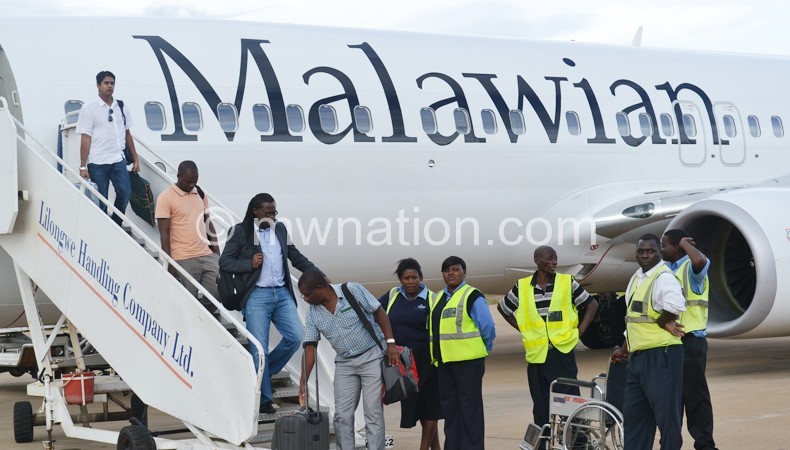Bailed out
Malawi Airlines will resume operations mid-next month after being grounded for over seven months, the company’s board chairperson George Patridge announced yesterday.
But authorities were tight-lipped on how much the shareholders—Malawi Government and Ethiopian Airlines—will pump into the cash-strapped airline to get it off the ground.
The move follows President Lazarus Chakwera’s decision to have the airline recapitalised rather than liquidate it, as had been proposed on the back of losses largely blamed on Covid-19 that has restricted air traffic.

Based on the airline’s board resolutions of March 25 2021, Malawi Airlines had cumulative losses of K14 billion ($17.86 million) in February 2021 against accumulated debts of K13.8 billion ($17.5 million), forcing it to cease operations.
But on Thursday, Partridge said in a statement that flights will resume mid-June, thanking shareholders for a ‘timely’ bailout.
He said: “This follows an agreement which was reached by our shareholders (Malawi Government and Ethiopian Airlines) to recapitalise the national flag carrier after the Board of Directors had earlier declared the company technically insolvent.
“The insolvency was mainly occasioned by the seven-month period the airline had no revenue when it was not in operation due to local and international lockdowns as a result of the Covid-19 pandemic while it was honouring significant fixed cost obligations”
While Treasury spokesperson Williams Banda said the Ministry of Information would be the best to comment on the figures, Information Minister Gospel Kazako did not pick up calls yesterday.
Even senior public relations officer for Malawi Airlines, Joseph Josiah, said the amount involved will depend on how Covid 19 plays out.
He said: “As you know, we are in the current financial situation largely due to the impact of the pandemic, which has hugely affected the entire industry and current projections indicate it may take at least two years before the industry picks up in terms of traffic.
“The good news for us this time is that the shareholders have committed to seeing the airline through this difficult time, until full recovery is possible.”
On how much injection is coming from government, Josiah said calculations were still being made.
“There is still some work being done, and yet to be finalised and when time is right, government, through the Ministry of Finance, will obviously make an announcement to the public on how much government will have decided to pump into the airline,” he added.
Recently, Weekend Nation revealed that Malawi Airlines—formed after the liquidation of Air Malawi—posted zero profits in the past five years, but paid over K41 billion for aircraft sub leases, management fees and other payments to its strategic investor, Ethiopian Airlines.
Partridge confirmed in an e-mail response at the time that the airline had not posted profits since it started in 2014.
He said: “Since the airline started, I can confirm it has not made any profits. The major return and primary objective of the investment was the general economic returns on the investment due to the connectivity that the airline is providing in the most efficient and effective way. This objective has largely been achieved compared to the time we had no national airline.”





